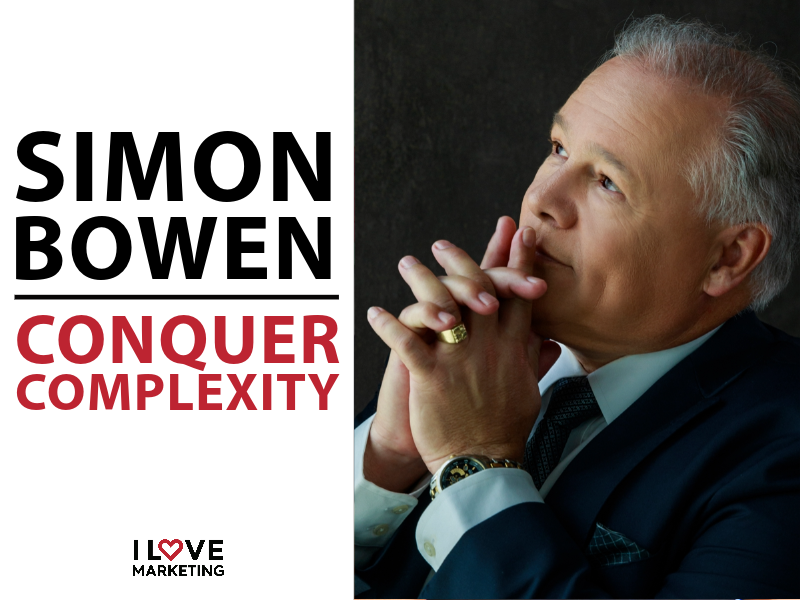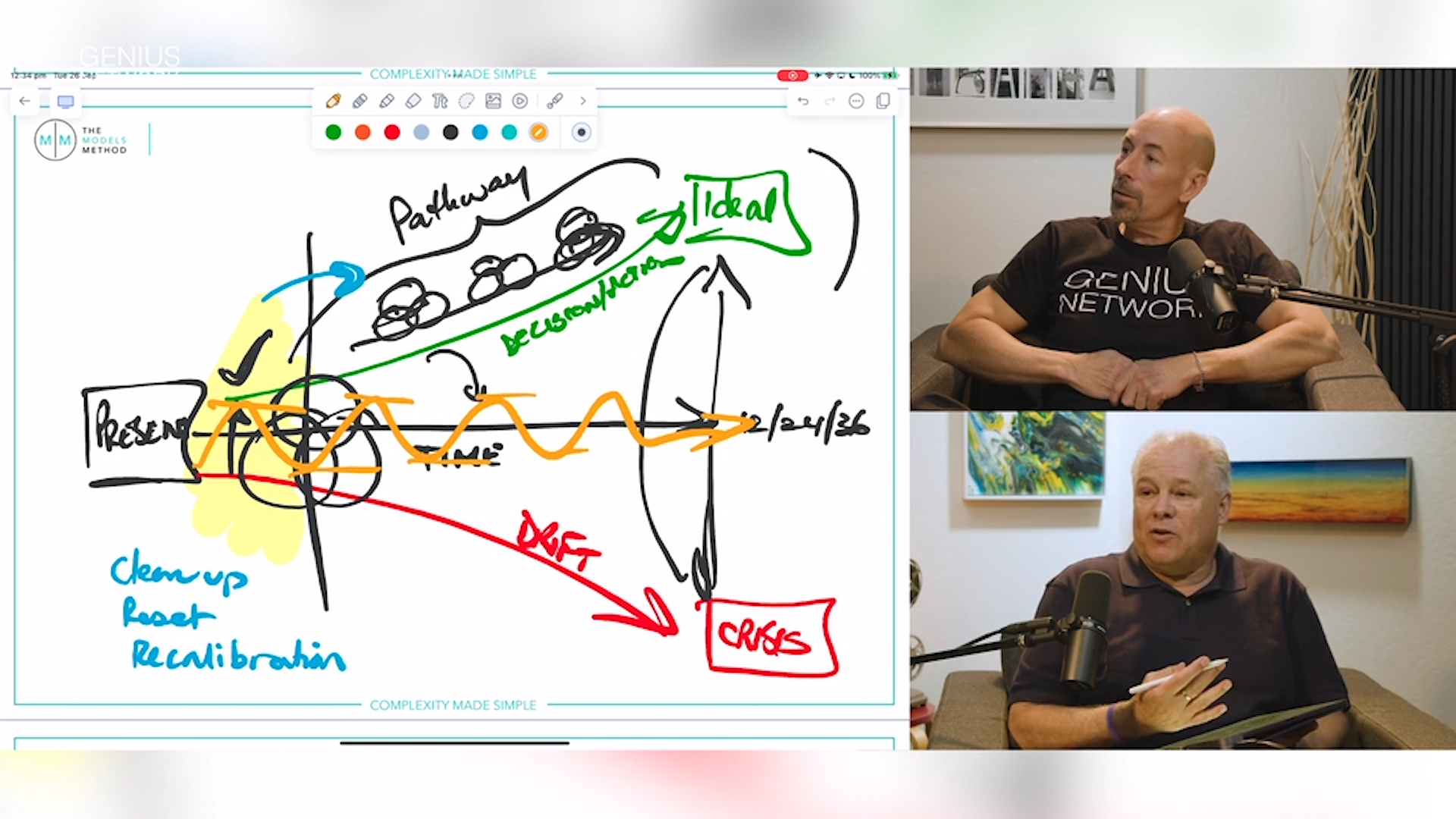
Share
Subscribe
Episode #461
Models That Matter: Simplify Sales, Conquer Complexity, and Delivery Value with Simon Bowen
Simon simplifies sales, reveals the secrets to connecting with Customers, and explores the power of visual models and effective communication.
If you’d like to join world-renowned Entrepreneurs at the next Genius Network Event or want to learn more about Genius Network, go to www.GeniusNetwork.com.
Here’s a glance at what you’ll learn from Simon Bowen and Joe Polish in this episode:
- 3 element of your company’s Genius and how it can impact your bottom line
- How to connect with your customers at a profound level to drive more sales
- The secret to selling more with visual models and unique communications
- What people are REALLY buying from you (PLUS: Three things they WANT most)
- Simon talks about how he communicates complex ideas simply and effectively
- The consequences of a product or service that doesn’t work (and how to fix it)
- Why context is key when it comes to sales conversations and getting results
- What the #1 responsibility and focus of any successful business ought to be
- The limitations (and possibilities) to build human relationships with AI
- Taking any sales conversation from shallow to deep with the “Iceberg Model.”
- Genius-Level strategies for marketing, selling, and framing almost anything
The Power of Transparent Sales
- Business is a massive responsibility, and it begins with ethical and transparent sales.
- The goal is to create a transparent sales process where clients are well-informed and empowered, not coerced.
The Responsibility of Business
- Business should exist to create value for its customers.
- Scaling a business requires scaling the sales process first, as it’s the foundation of success.
Selling as a Force for Good
- Selling is about helping clients make informed decisions.
- Drawing parallels to a surgeon’s pitch for surgery, selling should be seen as the start of a healing process.
The Art of Selling Ethically
- People love to be sold but hate to be pressured.
- Ethical marketing and selling involve enthusiasm for what you offer, not exaggeration or dishonesty.
The Obstacles to Effective Selling
- Many business owners struggle with selling effectively.
- Overcoming these obstacles involves connecting with your product or service at a profound level.
Company Genius Model
- A company’s core genius often stems from its founder.
- It includes the founder’s philosophy, history, and expertise.
The What: Context, Concept, Consequence
- Building a big idea that matters, has context, outlines the concept, and addresses the consequences.
- Context is often overlooked but crucial for value in a sales conversation.
The Path to a Better Future
- The speaker explains the concept of the green line and the red line, emphasizing the importance of making decisions to stay on the green line.
- While you can’t guarantee outcomes, you can guarantee the pathway to success.
Aligning Teams for Success
- Transparent sales not only transform business but also align teams and create a sense of certainty.
- Ethical sales and marketing empower businesses to make a positive impact.
- Incorporate these principles into your business and sales approach to create a more transparent, ethical, and value-driven enterprise.
- Selling should be a force for good, and your business can become a powerful agent of change when you sell with integrity and purpose.
Balancing Presentation and Deliverability:
- The conversation begins by addressing the challenge of matching the ability to present an idea with the deliverable.
- It emphasizes the importance of approaching challenges with a balance of firmness and empathy (a “fist in a velvet glove”) when attempting to persuade someone.
Experiencing and Selling the Green Line:
- Peter Hillary’s concept of the “experience line” is introduced, highlighting the idea that people are more motivated to act when they go through an actual experience rather than just discussing an issue.
- A hypothetical scenario is presented, where the focus is shifted away from labels like “climate change” and “global warming” and towards two potential futures: a green line where the planet thrives and a red line where the planet is harmed.
Navigating Climate Change Skepticism:
- The conversation delves into addressing individuals who view climate change as a hoax or an exploitative agenda.
- A model is suggested as a communication tool to discuss the issues, focusing on whether humanity is on the green line (no harm to the planet) or the red line (harming the planet).
The Ethics of Selling:
- The ethics of selling and marketing are explored, emphasizing the importance of selling ideas and products that are genuinely beneficial to individuals and society.
- The distinction between salespeople acting as educators who create a better future and those who exploit is highlighted.
Transparency in Sales and Influence:
- The changing landscape of sales and marketing is discussed, emphasizing the shift from buying products to buying into personalities.
- The concept of becoming a thought leader or hero to clients is explored, as well as the idea that everyone ultimately wants to win and be made safe.
Creating Buyer Safety:
- The discussion highlights the concept of “buyer safety,” which involves providing customers with a sense of safety and security.
- It’s noted that people often don’t want to be safe themselves but expect someone or something else to make them feel safe, such as government regulations or product guarantees.
Selling the Green Line:
- A hypothetical scenario is discussed, illustrating the importance of guiding individuals towards a desirable future, such as a “green line” where the planet thrives.
- Selling involves offering solutions that help customers both win and feel secure, ensuring they stay on the green line.
The Role of a Sage:
- The conversation introduces the concept of a sage, who possesses profound genius, powerful calm, and practical simplicity.
- The sage plays a key role in guiding and influencing clients, offering wisdom, and simplifying complex ideas through practical models.
The Genius Model:
- The genius model is explored, emphasizing the importance of placing the client’s context at the center of the model.
- The model includes three core circles: context, concept, and consequences, with nine accelerators bridging the gap between concept and reality.
Emotional Movements in Sales:
- The emotional movements in a sales process are discussed, including curiosity, tension, desire, confidence, and commitment.
- The goal is to lead potential clients through these emotional stages, ensuring they feel safer with each step in the process.
Establishing Trust and Rapport:
- Trust and rapport are highlighted as crucial elements in the sales process, with comfort being trust with comfort.
- The concept of disturbing by inaction is emphasized, suggesting that sales should evoke a sense of urgency and desire in potential customers.
Influence Beyond Feelings:
- The conversation touches on the idea of going beyond just selling feelings and encourages thought leadership in guiding clients towards a positive future.
Intro and Buying Decisions:
- People often make buying decisions based on emotions and feelings, even when purchasing seemingly functional products.
- High-end brands, like Rolex, Apple, and Louis Vuitton, offer more than just products; they provide status and an emotional experience.
Branding and Richard Branson:
- Richard Branson shared insights with the speaker about the power of branding.
- Apple was considered the most respected brand, highlighting the emotional connection and status linked to the brand.
Price vs. Cost and the Cost and Action Model:
- The speaker introduced the “cost and action model” to encourage deeper thinking in the sales process.
- He proposed the question: “What’s more important to you, price or cost?” to challenge customers’ perspectives.
- The model helps customers consider the cost of inaction, emphasizing the long-term consequences of not making a purchase.
Analog vs. Digital World:
- The conversation shifted to the difference between the digital world and the analog nature of humans.
- The power of drawing and analog processes in conveying complex ideas and engaging audiences effectively.
AI Limitations:
- AI was acknowledged as a valuable tool but limited in providing context, compassion, and understanding consequences.
- The importance of human context and wisdom was emphasized in problem-solving.
Founder’s Philosophy and Deeper Thinking:
- The need for businesses to define their unique value and philosophy in an AI-driven world.
- Retaining what is uniquely human in a business was seen as essential to stand out in the digital age.
Model: Going Deep in Sales Conversations:
- A model was presented for sales conversations, focusing on shifting from a shallow transactional approach to a deeper, transformational one.
- The example of an acne treatment professional was used to demonstrate the model.
- Key steps included neutralizing competitors, claiming outcomes, emphasizing transformation, and diving deep into the meaning for the customer.
The Ultimate Meaning:
- The model ultimately led to addressing the timeless aspect of a product or service and what it truly means to the customer.
- A deeper understanding of what a product or service represents to the buyer is crucial for building lasting connections.
The Model Method: The Iceberg Model:
- Simon introduces the Iceberg Model, a tool for effective communication and sales.
- The top of the iceberg represents the transactional level, which is the surface-level problem or need.
- The middle of the iceberg is where the game really starts. It represents the transformational level, the deeper emotional or aspirational needs.
- The base of the iceberg is the timeless level, where the profound, long-lasting impact and meaning reside.
Using the Iceberg Model:
- Simon provides an example using a non-surgical dermal therapist who treats acne.
- Rather than leading with price, Simon suggests focusing on the transformational level by asking, “Do you want to treat your acne, or do you want skin you love living in?”
- By reaching the timeless level of meaning, it takes price and competition out of the equation.
- Simon encourages businesses to think about what makes their offering truly timeless, as this level often goes unexplored.










TELL US WHAT YOU THINK, LEAVE A COMMENT BELOW